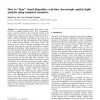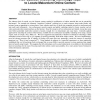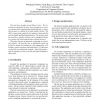3206 search results - page 31 / 642 » How minds can be computational systems |
107
click to vote
CORR
2006
Springer
15 years 1 months ago
2006
Springer
We study the complexity of influencing elections through bribery: How computationally complex is it for an external actor to determine whether by paying certain voters to change t...
101
click to vote
CIKM
2011
Springer
14 years 1 months ago
2011
Springer
This paper describes how to make use of e-books that look like printed books in a knowledge network. After an overview of digitalization efforts and current digital library initia...
112
click to vote
BC
1998
15 years 1 months ago
1998
Abstract. In a stereoscopic system, both eyes or cameras have a slightly dierent view. As a consequence, small variations between the projected images exist (`disparities') ...
134
click to vote
ISI
2005
Springer
15 years 7 months ago
2005
Springer
The inherent lack of control over the Internet content resulted in proliferation of online material that can be potentially detrimental. For example, the infamous “Anarchist Coo...
146
click to vote
IEEEAMS
2003
IEEE
15 years 7 months ago
2003
IEEE
The last three decades proved Moore’s Law. We witnessed an exponential increase in processing power, memory capacity and communication bandwidth and we expect this increase to c...



